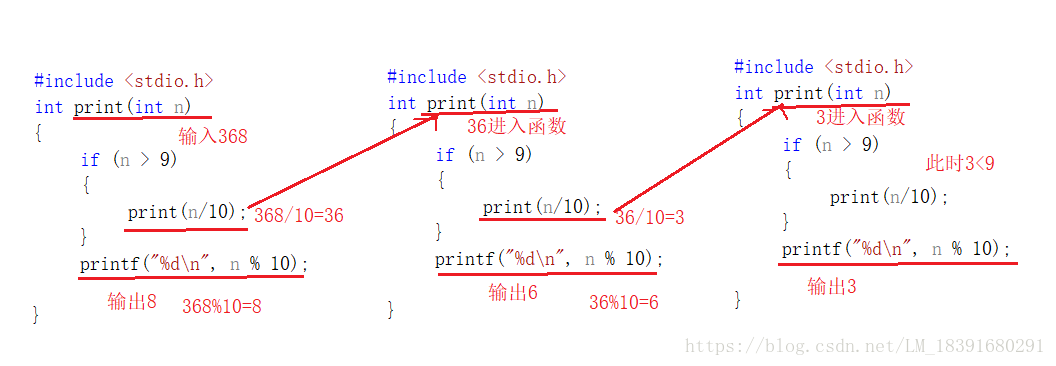递归的定义:程序调用自身的编程技巧称为递归。
递归的两个必要的条件:
1.存在限制条件,当满足这个限制条件的时候,递归便不再继续。
2.每次递归调用之后会越来越接近这个限制条件。
我们以一个代码为例:
输入任意数字,分别打印该数字的每一位。
#include <stdio.h>
int print(int n)
{
if (n > 9)
{
print(n/10);
}
printf("%d\n", n % 10);
}
int main()
{
int num = 0;
scanf("%d", &num);
print(num);
return 0;
}
这段代码中,假设我们输入一个三位数368,那么先打印36和8,然后再次将36调入,打印出3和6。
我们用一张图来表达一下这个过程

函数通过多次调用自身,达到单独打印出一个数字每一位的效果。
接下来,我们继续以一些实例来运用递归
不创建临时变量,求字符串的长度(strlen递归写法)
#include <stdio.h>
#include <assert.h>
int my_strlen(const char* str)
{
assert(str != NULL);
if (*str != '\0')
{
return 1 + my_strlen(str + 1);
}
else
{
return 0;
}
}
int main()
{
char *p = "abc";
int len = my_strlen(p);
printf("%d\n", len);
return 0;
}过程如图:

既然已经说到求字符串长度的问题,那么我们在拓展一下另一种strlen常规写法
#include <stdio.h>
#include <assert.h>
int my_strlen(const char* str)//因为My_strlrn只是求字符串的长度,并不改变它,加上const对他进行简单的保护
{
int count = 0;//定义一个计数器来计算字符串的长度
assert(str != NULL);//str 有可能为空指针,但我们不容许它为空,这里使用断言来限制它不为空
while (*str != '\0')
{//字符串不为零就持续向后计数
count++;
str++;
}
return count;;
}
int main()
{
char *p = "abcdef";
int len = my_strlen(p);
printf("%d\n", len);
return 0;
}递归方法求第n个斐波那契数
#include <stdio.h>
int fib(int n)
{
if (n <= 2)
{
return 1;
}
else
{
return fib(n - 1) + fib(n - 2);
}
}
int main()
{
int num = 9;
fib(num);
printf("%d\n", fib(num));
}非递归的方法这样写
#include <stdio.h>
int fib(int n)
{
int a = 1;
int b = 1;
int c = a;
while (n > 2)
{
c = a + b;
a = b;
b = c;
n--;
}
return c;
}
int main()
{
int n = 5;
printf("%d\n", fib(n));
return 0;
}递归求n的阶乘
#include <stdio.h>
int fac(int n)
{
if (n <= 1)
{
return 1;
}
else
{
return n*fac(n - 1);
}
}
int main()
{
int num = 5;
fac(num);
printf("%d\n", fac(num));
}我们在使用递归来计算一个比较大的斐波那切数的时候(均不考虑栈溢出),程序会特别的慢;在用递归计算很大的数时,程序会崩溃。其实是因为函数在频繁调用的过程中,很多计算一直重复,就会导致程序的效率降低。
系统分配给程序的栈空间是有限的,当出现死循环,或者不断的递归,一直开辟栈空间,最终导致栈空间耗尽,这样的现象我们叫做栈溢出
.




















 1379
1379

 被折叠的 条评论
为什么被折叠?
被折叠的 条评论
为什么被折叠?








